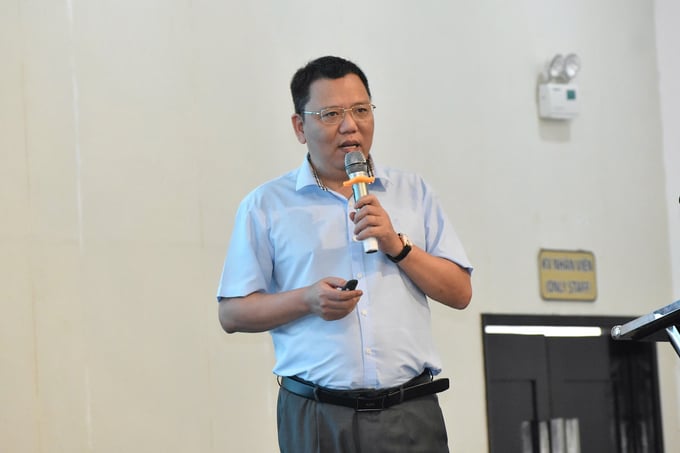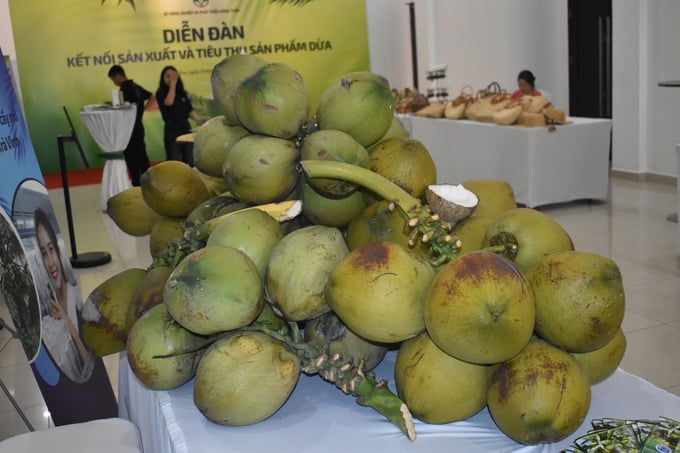June 17, 2025 | 23:55 GMT +7
June 17, 2025 | 23:55 GMT +7
Hotline: 0913.378.918
June 17, 2025 | 23:55 GMT +7
Hotline: 0913.378.918

Mr. Ngo Xuan Nam, Deputy Director of SPS Vietnam Office. Photo: Minh Dam.
According to the MARD, Vietnam currently occupies the fifth position globally in terms of coconut plantation area and production. Coconut is one of the six key crops identified in the development plan for main industrial crops.
At present, Vietnam has 15 provinces that cultivate coconuts, with an annual production of over 2 million kilograms and an area of approximately 200,000 hectares. Ben Tre has the greatest coconut plantation area in the country (approximately 47%) and has established six pilot concentrated coconut production zones, as well as five zones for organic coconut cultivation.
Vietnam's coconut products for domestic consumption and export are extremely diverse, including desiccated coconut, coconut milk, canned coconut water, coconut candy, nata de coco, and coconut oil, all of which are rooted in a long-standing tradition and farming practices. Consequently, Vietnam is the fourth-largest exporter of coconuts globally, having exported to more than 40 markets, including the United States, the European Union, Japan, Australia, South Korea, and China.
Fresh coconuts comprise approximately 25% of Vietnam's coconut and coconut product exports in 2023, which exceeded USD 900 million. Vietnam and China recently ratified a protocol on the export of fresh coconuts, which has created substantial opportunities for the fruit to access a market that consumes over 4 billion coconuts annually.
Despite its potential, enhancing coconuts' export value is not an easy mission. Major export markets frequently revise and update quarantine requirements, as Mr. Ngo Xuan Nam observed.
In 2024, the EU will modify the Maximum Residue Levels (MRLs) for substances such as Fenbuconazole, Penconazole, and Zoxamide.

Coconut products were displayed at the forum on the morning of December 13. Photo: Minh Dam.
Australia, for instance, categorizes coconuts into three categories: mature coconuts, fresh coconut meat, and young coconuts. An import permit from the Department of Agriculture, Fisheries, and Forestry is not necessary for young coconuts; however, they must be inspected and certified by competent authorities to guarantee that they are free of quarantine pests. Fresh coconuts must be dehusked and cleaned to ensure that they are free of pests, diseases, seeds, soil, plant trash, and other materials that could pose a Biosecurity Risk. The entry points of all cargoes are subject to inspection, with a random sample of 600 coconuts per container. Upon discovery of live insects or biosecurity concerns, the shipment will undergo treatment.
The Food and Drug Administration (FDA) in the United States requires that facilities that manufacture, process, package, or store food, pharmaceuticals, medical devices, radiological devices, tobacco, or biological products register prior to exporting to the US market. Exporters are required to put in place food safety systems, such as HACCP (Hazard Analysis and Critical Control Points). Pesticide residue and contaminant testing can be conducted by domestic laboratories, provided that they comply with US food safety standards.
In South Korea, food manufacturing facilities are required to register their name, location, and product inventory with the Ministry of Food and Drug Safety. The registration is valid for a period of two years. It is also possible to conduct on-site inspections.
The Basic Food Safety Act, the Food Sanitation Act, and the Food Labeling Act are among the seven food safety laws that Japan enforces. No MRLs have been established for 79 substances, including Azadirachtin, copper, zinc oxide, and urea, as Japan has determined that they do not pose any health hazards. Nevertheless, it has prohibited the use of 24 agricultural and other chemicals, such as Captafol and Malachite Green, as well as Nitrofurazone. Japan enforces a default limit of 0.01 ppm for substances that lack established MRLs.
Exporters are required to adhere to regulations such as the "Administrative Measures on Registration of Overseas Manufacturers of Imported Food" (Regulation 248) and the "Measures for the Supervision and Administration of Food Import and Export" (Regulation 249) in China, a significant export market for agricultural products, including coconuts. In order to obtain product and facility codes that are applicable for a period of five years, enterprises are required to register with the General Administration of Customs of China (GACC). Every two years, China updates its MRL list, and cross-border trade and negotiated market access for specific products are subject to more stringent controls.

Coconut is identified as a 'billion dollar' industry in the near future. Photo: Minh Dam.
Green coconuts and dehusked coconuts are among the fresh coconut products that must satisfy phytosanitary and food safety regulations when exported to China. Enterprises must execute a 2% sampling for testing purposes before export. Compliance with no violations for two years may result in a reduction of the sampling requirement to 1%.
In 2024, the sector's total export value is expected to be USD 250 million, with fresh coconut exports to China comprising 25% of this figure. This market presents a significant opportunity for Vietnam's coconut industry.
Translated by Linh Linh
/2025/06/17/2344-1-131758_261.jpg)
(VAN) Amid tariff risks and growing trade barriers in the U.S. market, Australia is emerging as a promising destination to sustain the growth momentum of Vietnam's shrimp exports.
/2025/06/17/2013-1-nongnghiep-112009.jpg)
(VAN) This notable growth trend reflects the global taste for fresh, nutritious fruits and the expanding use of lychees across various sectors.

(VAN) The political and cultural insulation of Japan’s beloved grain is falling apart, and experts warn the country’s relationship with the staple will have to adapt.

(VAN) Noting risks, report examines impacts of avian influenza, changing trade patterns since 2022, fish fraud, and shipping industry’s net-zero goals.

(VAN) Mr. Tran Quang Bao, General Director of the Forestry and Forest Protection Department, met and worked with the International Wood Products Association to promote cooperation in the field of timber trade.

(VAN) China's outbound shipments of rare earths in May jumped 23% on the month to their highest in a year, though Beijing's export curbs on some of the critical minerals halted some overseas sales.

(VAN) To sustain capital flow, administrative reform alone is not enough; what farmers truly need is an ecosystem where both government and businesses grow together in support.